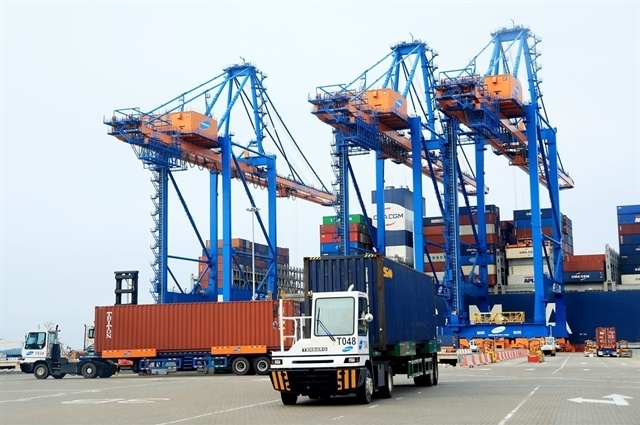Many industries will benefit from Vietnam - Israel FTA
Monday, September 29,2025
AsemconnectVietnam - Vietnam - Israel FTA, effective from November 17, 2024, is opening up great opportunities for economic, trade and investment cooperation between the two countries.
Potential industries
Vietnam - Israel Free Trade Agreement (VIFTA) was signed on July 25, 2023 in Israel and officially took effect on November 17, 2024. This is a result of tireless efforts of both countries after 7 years with 12 negotiation sessions.
The agreement consists of 15 chapters and a number of appendices attached to chapters with basic contents such as trade in goods, services - investment, rules of origin, technical barriers to trade (TBT), sanitary and phytosanitary measures (SPS), customs, trade defense, government procurement, legal - institutional.
With agreement reached in all chapters, especially strong commitment of both sides to increase rate of trade liberalization with overall liberalization rate by the end of commitment roadmap of Israel being 92.7% of tariff lines while that of Vietnam is 85.8% of tariff lines. Two sides expect that two-way trade will have remarkable growth, soon reaching 3 billion USD and higher in the coming time.
Not only contributing to increasing turnover of goods exchange, VIFTA is expected to be a lever to strengthen cooperation between two countries in investment, services, digital transformation, technology, etc.
According to Department of Multilateral Trade Policy (Ministry of Industry and Trade), signing and implementation of VIFTA creates favorable conditions for Vietnam to promote export of its strengths not only to Israel but also to have opportunity to access other markets in the Middle East, North Africa and Southern Europe.
On other hand, in addition to Vietnam's market of over 100 million people, Israeli goods and technology have the opportunity to access markets in ASEAN, Asia-Pacific countries and major economies in the 17 FTAs that Vietnam has participated in.
Providing more information about Vietnam's strong industries that can boost exports to Israel when VIFTA comes into effect, leader of Multilateral Trade Policy Department said that science and technology is one of very important driving forces to create high and long-term economic growth.
"Israel is considered one of the success stories in terms of startups and innovation, where there are many sources of technology and skills from which Vietnam can learn" - leader of Multilateral Trade Policy Department informed and added that although this is a relatively small-scale export market, it is also a very good market if it can be linked with this economy.
Along with field of science and technology, seafood is also one of many potential products to boost exports to Israel. Mr. Truong Dinh Hoe, General Secretary of Vietnam Association of Seafood Exporters and Producers (VASEP), explained that in structure of seafood exports, although Israeli market accounts for a small proportion, this is a very potential market because Israel is a market with high purchasing power and payment capacity.
In addition, Israel is a country without natural resources, limited domestic labor resources, although it is a small country, consumption demand is quite large. Therefore, this market still has a lot of room for Vietnamese seafood enterprises to exploit effectively.
Associate Professor Dr. Ngo Tri Long added that because Israel's natural conditions are very difficult, the country's trade activities are mainly imports, especially consumer goods. According to published data, Israel imports about 35 billion USD of consumer goods every year. Meanwhile, this industry is one of Vietnam's strengths.
In addition, in field of agricultural products, General Secretary of Vietnam Fruit and Vegetable Association Dang Phuc Nguyen commented that Israel has a highly developed agriculture with very high technology but the fruits are not diverse, so Vietnam has more advantages. "We can export dragon fruit, durian, lychee, longan... to Israel" - Mr. Nguyen informed.
Grasping market information to effectively implement the agreement
Mr. Le Thai Hoa, Trade Counselor, Trade Office - Embassy of Vietnam in Israel said that in the first 5 months of 2025, despite being affected by conflict in the Middle East, two-way trade between Vietnam and Israel still reached 1.565 billion USD, an increase of 44.64% over the same period in 2024, of which Vietnam's exports to this market reached 354 million USD and equal to the same period last year.
In the first 6 months of 2025, two-way trade reached 1.825 billion USD (estimated to increase by 31.2% over the same period last year), of which exports to Israel recorded an increase of 425 million USD. It is expected that in the whole year of 2025, if there are no sudden instability in the market, two-way trade could reach nearly 3.7 billion USD (expected to increase by 13.95% over the previous year), of which exports to Israel will reach approximately 900 million USD (expected to increase by 13.21% over 2024).
“With a market capacity/population size of nearly 10 million people and a conflict area that always has many potential instabilities, these are quite impressive numbers and have practical effects” - Mr. Le Thai Hoa informed.
Currently, due to negative impact of conflict, Israel has a broken supply of goods from outside and has a great demand for many types of products.
Israeli businesses are increasingly looking for supply sources, including from Vietnam, to replace broken sources and meet domestic consumption needs. However, it is forecasted that in the coming time, export activities to this market will face major fluctuations when geopolitical conflicts continue to occur.
For example, with seafood products, information from VASEP shows: “Tuna exports to some smaller niche markets such as Israel, Russia, and Chile in June are also declining sharply. Escalating conflict in the Middle East is strongly affecting tuna exports to this market. Tuna exports to Israel have therefore continuously declined in the first 6 months of this year.”
Therefore, in coming time, to maintain and boost exports to this market, Mr. Le Thai Hoa recommends that Vietnamese export enterprises should take advantage of opportunity to boost exports of product groups that Israel currently has a large import demand for, such as foodstuffs, consumer goods, and construction materials... because Israel has a broken supply source and is increasingly looking for external sources of supply.
In addition, it is necessary to closely monitor the situation in Israel, pay attention to risks of cargo ships moving on route passing through Yemen to the Red Sea and consider purchasing risk insurance for exported goods as well as choosing appropriate sea freight routes to avoid risks.
Source: Vitic/ congthuong.vn
Vietnam - Israel Free Trade Agreement (VIFTA) was signed on July 25, 2023 in Israel and officially took effect on November 17, 2024. This is a result of tireless efforts of both countries after 7 years with 12 negotiation sessions.
The agreement consists of 15 chapters and a number of appendices attached to chapters with basic contents such as trade in goods, services - investment, rules of origin, technical barriers to trade (TBT), sanitary and phytosanitary measures (SPS), customs, trade defense, government procurement, legal - institutional.
With agreement reached in all chapters, especially strong commitment of both sides to increase rate of trade liberalization with overall liberalization rate by the end of commitment roadmap of Israel being 92.7% of tariff lines while that of Vietnam is 85.8% of tariff lines. Two sides expect that two-way trade will have remarkable growth, soon reaching 3 billion USD and higher in the coming time.
Not only contributing to increasing turnover of goods exchange, VIFTA is expected to be a lever to strengthen cooperation between two countries in investment, services, digital transformation, technology, etc.
According to Department of Multilateral Trade Policy (Ministry of Industry and Trade), signing and implementation of VIFTA creates favorable conditions for Vietnam to promote export of its strengths not only to Israel but also to have opportunity to access other markets in the Middle East, North Africa and Southern Europe.
On other hand, in addition to Vietnam's market of over 100 million people, Israeli goods and technology have the opportunity to access markets in ASEAN, Asia-Pacific countries and major economies in the 17 FTAs that Vietnam has participated in.
Providing more information about Vietnam's strong industries that can boost exports to Israel when VIFTA comes into effect, leader of Multilateral Trade Policy Department said that science and technology is one of very important driving forces to create high and long-term economic growth.
"Israel is considered one of the success stories in terms of startups and innovation, where there are many sources of technology and skills from which Vietnam can learn" - leader of Multilateral Trade Policy Department informed and added that although this is a relatively small-scale export market, it is also a very good market if it can be linked with this economy.
Along with field of science and technology, seafood is also one of many potential products to boost exports to Israel. Mr. Truong Dinh Hoe, General Secretary of Vietnam Association of Seafood Exporters and Producers (VASEP), explained that in structure of seafood exports, although Israeli market accounts for a small proportion, this is a very potential market because Israel is a market with high purchasing power and payment capacity.
In addition, Israel is a country without natural resources, limited domestic labor resources, although it is a small country, consumption demand is quite large. Therefore, this market still has a lot of room for Vietnamese seafood enterprises to exploit effectively.
Associate Professor Dr. Ngo Tri Long added that because Israel's natural conditions are very difficult, the country's trade activities are mainly imports, especially consumer goods. According to published data, Israel imports about 35 billion USD of consumer goods every year. Meanwhile, this industry is one of Vietnam's strengths.
In addition, in field of agricultural products, General Secretary of Vietnam Fruit and Vegetable Association Dang Phuc Nguyen commented that Israel has a highly developed agriculture with very high technology but the fruits are not diverse, so Vietnam has more advantages. "We can export dragon fruit, durian, lychee, longan... to Israel" - Mr. Nguyen informed.
Grasping market information to effectively implement the agreement
Mr. Le Thai Hoa, Trade Counselor, Trade Office - Embassy of Vietnam in Israel said that in the first 5 months of 2025, despite being affected by conflict in the Middle East, two-way trade between Vietnam and Israel still reached 1.565 billion USD, an increase of 44.64% over the same period in 2024, of which Vietnam's exports to this market reached 354 million USD and equal to the same period last year.
In the first 6 months of 2025, two-way trade reached 1.825 billion USD (estimated to increase by 31.2% over the same period last year), of which exports to Israel recorded an increase of 425 million USD. It is expected that in the whole year of 2025, if there are no sudden instability in the market, two-way trade could reach nearly 3.7 billion USD (expected to increase by 13.95% over the previous year), of which exports to Israel will reach approximately 900 million USD (expected to increase by 13.21% over 2024).
“With a market capacity/population size of nearly 10 million people and a conflict area that always has many potential instabilities, these are quite impressive numbers and have practical effects” - Mr. Le Thai Hoa informed.
Currently, due to negative impact of conflict, Israel has a broken supply of goods from outside and has a great demand for many types of products.
Israeli businesses are increasingly looking for supply sources, including from Vietnam, to replace broken sources and meet domestic consumption needs. However, it is forecasted that in the coming time, export activities to this market will face major fluctuations when geopolitical conflicts continue to occur.
For example, with seafood products, information from VASEP shows: “Tuna exports to some smaller niche markets such as Israel, Russia, and Chile in June are also declining sharply. Escalating conflict in the Middle East is strongly affecting tuna exports to this market. Tuna exports to Israel have therefore continuously declined in the first 6 months of this year.”
Therefore, in coming time, to maintain and boost exports to this market, Mr. Le Thai Hoa recommends that Vietnamese export enterprises should take advantage of opportunity to boost exports of product groups that Israel currently has a large import demand for, such as foodstuffs, consumer goods, and construction materials... because Israel has a broken supply source and is increasingly looking for external sources of supply.
In addition, it is necessary to closely monitor the situation in Israel, pay attention to risks of cargo ships moving on route passing through Yemen to the Red Sea and consider purchasing risk insurance for exported goods as well as choosing appropriate sea freight routes to avoid risks.
Source: Vitic/ congthuong.vn
Vietnam domestic animal feed market – September 2025
Vietnam Fertilizer Market – September 2025
Assessing the impact of the EVFTA agreement on Vietnam's coffee exports to the EU in the first 5 months of 2025
Exports to Netherlands reached over 8.6 billion USD in 8 months of 2025
Wheat imports worth over 1.02 billion USD in 8 months of 2025
Vietnam to achieve target of 65 billion USD in agricultural, forestry and fishery exports
Vietnam - Singapore trade turnover reached nearly 26 billion SGD
Fruit and vegetable exports accelerate towards a record of 8 billion USD
Corn imports reached nearly 1.73 billion USD in 8 months of 2025
The multi-billion dollar industry seeks strategic direction in RCEP
RCEP creates a 'new wind' for Vietnam's pangasius exports
Main commodity groups exported to South Korea in 8 months of 2025
Exports to Japan in the first 8 months of 2025 increased
Vietnam’s coffee exports to the EU surge in the first five months of 2025 thanks to EVFTA

Plan of Hai Duong province for a period of 2021 - 2030, ...
Organize space reasonably and harmoniously, focusing on connecting Hai Duong in common development space, actively contributing to the ...Plan of Hau Giang province in a period of 2021 - 2030, ...
Sustainable forestry development program in a period of ...

LION Championship 25 to feature title showdowns in Khanh ...
LION Championship 25 will take place at Cam Ranh Square in south-central Khanh Hoa province, at 20:00 on August 16, featuring two of the ...Bai Dinh Pagoda named outstanding destination with ...
Party chief attends special political–art programme “Under ...



